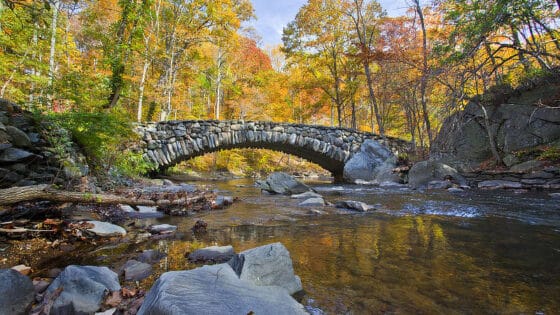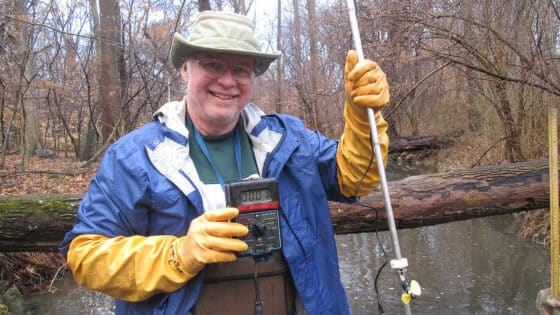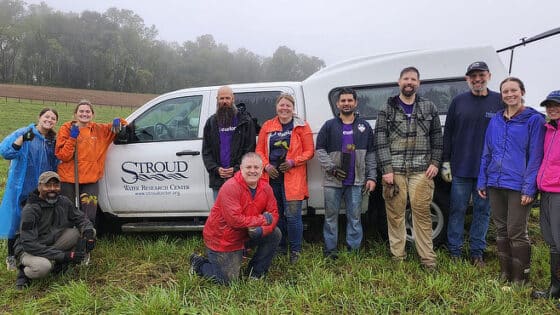Hello, Sherman Roberts
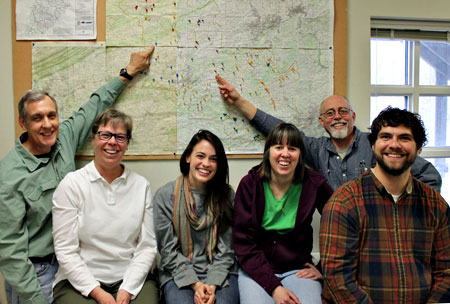
More than 40 years ago, when Sherman Roberts was scarcely out of high school and unsure of his career path, his aunt suggested volunteering at Stroud Water Research Center. “I was kind of a dazed, confused young man,” he says. So he took her advice, and that was it for Roberts: “I found my niche.”
He started as a volunteer and quickly worked his way up to become a full-time staff scientist. Detailed-oriented and an outdoor enthusiast, Roberts was and is well-suited to the fieldwork and processing of water and insect samples that are required for the position.
Nearly every research group at Stroud Center has benefited from his skills and work ethic. When he started in 1972, he worked under Robin Vannote, director emeritus, in the Entomology Group. Eager to learn and assist wherever needed, he moved into the Microbiology Group and then Biogeochemistry.
Now back in Entomology, his time at Stroud Center has come full circle. John Jackson, Ph.D., who leads the Entomology Group, comments, “Sherman has long been known for his flexibility and enthusiasm.”
As much as he enjoys the work, Roberts says he most values “the remarkable group of people here. We couldn’t do what we do without the dedication we have toward the work and toward each other.” Roberts proudly acknowledges that the Entomology Group’s field and technical staff have more than 100 years of combined experience working at Stroud Center.
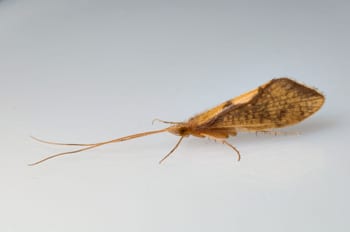
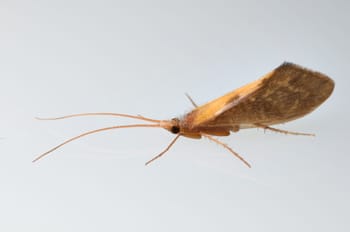
Our Entomology Group is trained to identify aquatic insects to the species level, which isn’t always easy. These two caddisflies, commonly found in White Clay Creek, are of the same genus but different species. The wings of a Neophylax mitchelli, compared to those of the Neophylax oligius, feature a more prominent pattern of speckles. Photos: Dave Funk
Hello, Kelly McIntyre
Kelly McIntyre came to Stroud Center as an intern last May. She graduated with a Bachelor of Science in environmental science from Dickinson College in May and was subsequently hired in January to work as a staff scientist for the Entomology Group.
With guidance from her more experienced colleagues in the group, McIntyre is learning to sort insect samples to the genus and species levels. “The people here are very concerned with integrity and making sure we properly identify species,” she says.
Everyone in this group is everything I could have hoped for: They’ve been welcoming and kind, and they’re always willing to help me learn and grow. I’m surrounded by amazing minds and kindhearted people.”
Of McIntyre, Jackson says, “Her energy and laugh are a positive and contagious addition.”
During her time at Dickinson, McIntyre worked for the Alliance for Aquatic Resources Monitoring, a nonprofit that teaches volunteer stream monitoring. That experience cemented her decision to pursue a career in fresh water. “Water is a vital resource—one that’s easy to take for granted—and it’s important to know how to protect our fresh water.”
Goodbye, Roberta Weber
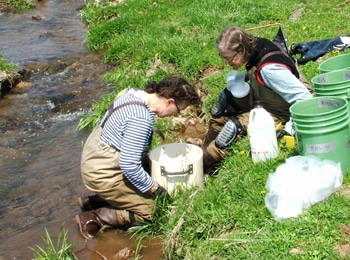
Roberta Weber came to Stroud Center in April 1983 and retired in December 2014. Often referred to by Stroud Center staff as the other half of dear friend and fellow entomology staff scientist Sally Peirson, she will be greatly missed. She dedicated 31 years of her career to the Entomology Group.
Jackson says, “She was a great coworker. She made sure each project was a success by focusing on her responsibilities while also helping everyone else with theirs. We miss her daily—professionally and personally.”
A native of New Castle, Delaware, she attended DeLaWarr High School, where her science teacher, Mr. O’Neill, inspired her to study biology in college. She spent two years in the Philippines as a Peace Corps volunteer working in rural public health, and upon her return to the U.S., she enrolled in the University of Delaware’s entomology graduate program. Thereafter, she joined Stroud Center’s staff.
After giving so much of herself to Stroud Center, both its people and its mission, she’s enjoying some well-deserved time in her garden.

